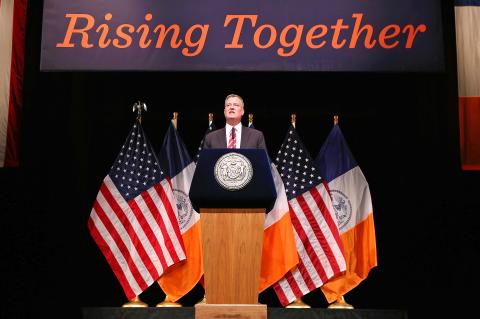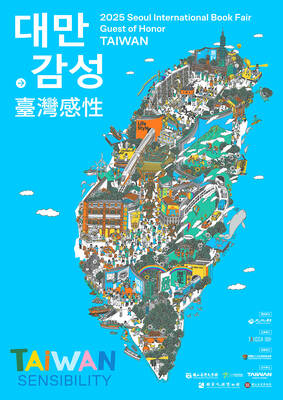Chinese Practice
水漲船高
(shui2 zhang3 chuan2 gao1)

Photo: AFP
照片:法新社
when the water level goes up, all boats rise
英文片語a rising tide lifts all boats一般多認為出自美國前總統甘迺迪於一九六三年發表的演講,意指經濟好時,經濟體中所有人皆可受惠。甘迺迪的演講撰稿人泰德索倫森在其後曾表示這個片語並非甘迺迪或他所創,而是他幾年前在一個地方商會的信紙上看到的。甘迺迪在演講上使用了這個片語,但不是這個片語的創始人。
A rising tide lifts all boats這個說法至今已有至少一世紀的歷史,在美國一九一○年代出版的宗教書報中額為常見。這個片語看似源自於某個臨海的漁村,同樣的濱海意境,與在其一千年前出現的中文成語「水漲船高」有異曲同工之妙。
在西元一千○四年,中國宋朝的釋道原撰寫《景德傳燈錄》,記錄了多名禪師與僧人的禪法。書中提及「水長船高,泥多佛大」。「水漲船高」用於形容某人或事物提升後,連帶讓仰賴其的人或事物也跟著提升。而「泥多佛大」亦可單獨使用,意指深穩的根基或支持能造就成功。
(台北時報編譯涂宇安譯)
這名歌手爆紅後,他的樂團身價也水漲船高,現在有多家唱片公司都想要挖角他們。
(After this singer became very popular, his whole band became really famous, too, and now lots of record companies are looking to poach them.)
英文練習
a rising tide lifts all boats
Former US president John F. Kennedy is often credited with the phrase “a rising tide lifts all boats,” from a speech he made in 1963. The phrase is understood to mean that favorable economic conditions will improve the lot of all participants in that economy. His own speechwriter, Ted Sorensen, later debunked the idea that Kennedy — or he himself for that matter — had come up with the phrase, noting that he had seen it on a regional chamber of commerce letterhead some years earlier. Kennedy did use it, but it didn’t originate with him.
There are numerous references to the phrase in print in religious publications dating to the 1910s in the US, making the phrase at least a century old. You would expect it to have originated, perhaps, in a coastal fishing community. A similar mental image certainly occurred to another writer in a different place and at a different time: in China, 1,000 years ago.
During the Song dynasty, in the year 1004AD, the monk Shi Daoyuan published a book called Complete Record of the Transmission of the Lamp, a record of Ch’an (Zen) masters and other prominent Buddhist monks. In it appear the words 「水長船高,泥多佛大」, meaning “when the water rises, the boats are lifted high; the more clay there is, the larger the Buddha [statue]. The idiom 水漲船高 is now used to express the idea that when a person or object advances, so do the people or things that rely on them. Interestingly, the second part of the phrase, 泥多佛大, can be used as an idiom in its own right, a reference to the importance of support for the success of a venture.
(Paul Cooper, Taipei Times)
The growing poverty gap in many countries suggests that a rising tide does not, in fact, lift all boats.
(許多國家的貧富差距都在增大,這顯示整體經濟提升並不會改善所有人的生活。)

The 2025 Seoul International Book Fair was held from June 18 to 22 at the COEX Convention & Exhibition Center in Seoul, South Korea. This year, participants from 17 countries attended, with over 530 publishing houses and related organizations taking part. For the first time, Taiwan participated in the book fair as the Guest of Honor, bringing together more than 85 publishers and presenting a curated selection of 550 titles. A delegation of 23 Taiwanese creatives traveled to Seoul to attend the event, including 13 literary authors, six illustrators, and four comic book artists, among which were a film director, an

In late 2024, the suicide of acclaimed Taiwanese author Chiung Yao at 86 sparked a societal debate. She expressed her desire to avoid the difficult aging process and sought to govern her own death rather than leave it to fate. Her statements propelled the issue of “euthanasia” back into the public arena, posing the question of whether Taiwan should legalize euthanasia to grant patients and the elderly the right to die with dignity. Euthanasia, the intentional ending of a life to relieve suffering, is legal for humans in countries like the Netherlands and Belgium but remains prohibited in Taiwan.

A: Wow, the 36th Golden Melody Awards ceremony is set for this weekend. B: I like all the nominees for Best Mandarin Album: Incomplete Rescue Manual by various artists, Outcomes by J.Sheon, Invisible Color by Terence Lam, The Dreamer by Khalil Fong, Haosheng Haochi by Trout Fresh and Ordeal by Pearls by Waa Wei. A: Despite struggling with serious illness, Fong managed to finish his last album before he died. B: With his hit Twenty Three, he is also nominated for Best Song, Lyricist and Composer, and will receive a Special Jury Award for his album. A: And

A: The Golden Melody Awards’ Lifetime Achievement Award will go to both musician Bruce Wong and late singer Jeff Ma. B: Some superstars also won this honor in the past, such as late singer Teresa Teng. A: Speaking of Teresa, have you heard that an unreleased Japanese song of hers was found recently? B: Really? Will the song be released? A: Yes, her track Love Song in the Night Fog is set to be released this month, marking the 30th anniversary of the legendary singer’s death. A: 本屆金曲獎特別貢獻獎頒給樂手翁孝良、已故歌手馬兆駿。 B: 以往有不少超級巨星,像是已故歌后鄧麗君也曾獲此殊榮唷。 A: 說到鄧麗君,你有聽說她生前未發布的日文歌曲被發現了嗎? B: 真的嗎?新歌會公開嗎? A: 這首歌《情歌最愛夜霧時》預計本月發布,正好紀念傳奇歌后去世30週年! (By Eddy